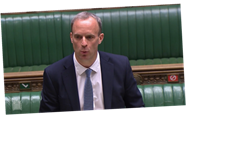BRITAIN has today scrapped the extradition treaty with Hong Kong as Boris Johnson vowed to get "tough" on China.
The Foreign Secretary Dominic Raab confirmed this afternoon that the UK will change the rules on extraditions to China as relations reached boiling point.
Addressing the Commons, Mr Raab accused China of a "serious violation" and announced a series of hardline new measures.
He said: "Given the role China has now assumed for the internal security of Hong Kong, and the authority it is exerting over law enforcement, the UK will extend the arms embargo we have applied to mainland China.
"The Government has decided to suspend the extradition treaty immediately and indefinitely.
"We will not consider reactivating those measures unless there are clear and robust safeguards which are able to prevent extradition from the UK being misused under the new national security legislation.
"I will just say this the UK is watching and the whole world is watching."
Mr Raab insisted Britain "wants a positive relationship with China", but warned that it was not willing to look the other way.
He said: "As we strive for that positive relationship we are also clear sighted about the challenges ahead.
"We will be clear where we disagree, and have been clear about the grave concerns regarding the gross human rights abuses being perpetrated against the Uighur Muslims in Xinjiang.
"It is precisely because we acknowledge china's role in the world that we expect China to live up to its responsibilities."
The announcement came just hours after Boris tore into the Communist state, saying those in Hong Kong had a "right" to protest.
But the PM warned he was "not going to be pushed into a position of being a knee-jerk sinophobe on every issue to do with China."
He added: "What we won't do is completely abandon our relationship with China, China is going to be a giant factor in our geopolitics, we've got to have a calibrated response.
"We're going to be tough on some things but also continue to engage (with China) on others."
The move follows the US, Australia and Canada scrapping extradition agreements to Hong Kong.
It comes as tensions between the UK and China escalated after the Government banned Huawei – the Chinese Communist party owned telecoms giant – from the 5G network in Britain.
This included suspending Britain's extradition to Hong Kong after national security laws meant those sent back could be hauled in front of Chinese courts and jailed in China.
The Government claims the change violated the Sino-British Joint Declaration.
The declaration was supposed to guarantee Hong Kong freedom from Chinese rule under the "one county, two systems" model for 50 years after the handover of the former British colony in 1997.
The law prohibits what Beijing views as secessionist, subversive or terrorist activities or as foreign intervention in Hong Kong affairs.
Pro-democracy leader Nathan Law fled to the UK after the law came into effect this month.
He told The Sunday Times he was afraid he may never be allowed to go back to Hong Kong.
A 15-year-old girl waving a pro-democracy flag in Hong Kong on the day the law came into effect was among 10 people arrested under the legislation.
The law grants police massive powers to conduct searches without warrants and order internet service providers and platforms to remove messages deemed to be anti-China.
The Government has already taken strong action, offering three million Hongkongers eligible for a British National (Overseas) passport a path to UK citizenship.
The Chinese ambassador to the UK Liu Xiaoming warned Britain not to enter into a "tit-for-tat" confrontation or follow the US in its sanctions on Chinese officials over alleged human rights abuses of Uighur muslims in Xinjiang.
What is the new national security law?
The law will criminalise any act of subversion, terrorism or collusion with foreign forces.
The heaviest penalty that can be imposed is life in jail, the editor in chief of the Global Times newspaper claimed after citing those who have seen the draft of the law.
Under the law, damaging public transport can be considered terrorism and those found guilty will be banned from standing for public office.
Some trials will not be held in public while individuals can be wire-tapped and put under surveillance if they are suspected of criminality.
Beijing is also set to establish a security office in Hong Kong with its own law enforcement personnel and with the power to send some cases to mainland China to be tried.
Beijing will further have power over how the law should be interpreted and Hong Kong will have to establish its own national security commission to enforce the laws, with a Beijing-appointed adviser.
Mr Raab played down suggestions sanctions against officials could be brought in under the UK's new human rights scheme which can impose tough restrictions on abusers – including travel bans.
He insisted that Britain wanted a "positive relationship" with China.
Chair of the defence select commit Tobias Ellwood called for a "reset of our entire foreign policy" to fight back against Chinese aggression.
He told BBC Radio 4's Westminster Hour programme that Britain had been "duped over the couple of decades" by China and needed to hit back with a firm hand.
He said: “I really want to see a reset of our entire foreign policy, bearing in mind that we are sliding towards a cold war, we can’t do this on our own, we need to work with our allies.”
“We turned a blind eye to what was going on with the Uighur population, we turned a blind eye to the uneven trade situation whereby Chinese companies could operate quite liberally within the UK and elsewhere but our companies couldn’t operate within China and now I think it’s time to say enough is enough.”
Source: Read Full Article



